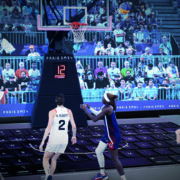The act of personalizing the fan experience helps sports organizations and rights holders to diversify their marketing efforts when pitching tailored content to individual (and groups of) subscribers at different stages of the fan funnel. By leveraging unique fan data to best understand why fans engage with the brand, sports properties with a dynamic digital ecosystem are more adept at segmenting their communications, whether that be to identify opportunities to acquire new audiences via their channel matrix or to highlight behaviors and trends among their paying customers.
Where sports organizations are augmenting their owned, direct-to-consumer (D2C) experiences, a customer relationship management (CRM) system will eventually be necessary to manage and differentiate large quantities of first-party user data. Meanwhile, a CRM capability which is scalable and consolidates data from multiple touchpoints also enables the rights holder to see changes in fan behavior in real-time, opportunities to expand their portfolio based on user demands, and importantly which stage of the fan funnel their users currently occupy.
Moreover, this helps identify opportunities for personalizing the digital experience, too, including options for subscribers to select from multiple communications preferences and opt into content featuring their favorite teams and athletes. Nevertheless, according to our proprietary research, this isn’t widely adopted among elite sports properties, including International Federations (IF) and national governing bodies (NGB) which feature in the most popular international tournaments (see table below).
Albeit the majority of governing bodies collect first-party fan data, our research shows that a higher percentage of Olympic IFs allow their digital subscribers to personalize the fan experience (50 percent) compared to NGBs represented in other international major events, including the men’s FIFA World Cup (34 percent), Rugby World Cup (35 percent), and T20 Cricket World Cup (20 percent). Meanwhile, Olympic organizations are more likely to enable users to personalize the UX via both web and mobile. Readers can learn more about this in our upcoming Fan Engagement and Commercialization Guide 2024, which will be published soon.
To gain this level of adaptability across the fan journey, CRM is becoming standard practice for organizations to personalize the user experience (UX) and to identify the best channels for engaging fans at various stages of the funnel. This also applies to “retargeting” fans and reengaging users who were once highly active on the rights holder’s paid platforms but have since become less engaged. This will be useful for sports properties exploring ways to increase fan engagement through its tailored content, based on their respective channel matrix.
ARTIFICIAL INTELLIGENCE MAKING IT EASIER TO PERSONALIZE THE USER EXPERIENCE
Sports organizations and rights holders are adopting artificial intelligence (AI) and machine learning solutions to personalize the fan experience and enhance their data governance. From the use of homepage chatbots and instant messaging, to the personalization of non-live video content and the assessment of athlete performance, automated and assistive technologies are altering the way the sports property’s front office communicates with its fans and stakeholders and personalizes the UX.
According to a Forbes Advisor survey, covering multiple industries, 73 percent of businesses currently use or plan to adopt AI-powered chatbots, while 61 percent consider AI valuable for delivering email campaigns and 55 percent use AI to personalize their service offering. By comparison, elite sports teams and leagues are adopting AI to customize the fan experience, too – though not at the same rate of adoption as other sectors.
In North America, for example, proprietary N3XT Sports research carried out for our 2024 Digital Trends in the Sports Industry report, published in February, shows that 60 percent of the National Basketball Association (NBA) teams have integrated an AI-powered chatbot into their dedicated website to provide fans with automated answers to queries such as ticketing, travel, and merchandising. This was higher than other major North American sports leagues at the time the report was published. In the National Hockey League (NHL), 46.6 percent of teams utilize AI-assisted chatbots in their owned-D2C portfolio and represents slightly more than the 40.6 percent of National Football League (NFL) teams which adopt chatbot technology.
As the sector evolves, automated processes will continue to help sports properties to access and analyze user data across their communications and extends to the personalization of the employee-stakeholder experience, as well as the fan’s, whereby users manage and segment large quantities of information with greater detail, accuracy, and speed. For example, as part of our partnership with the Professional Footballers’ Association (PFA), N3XT Sports is examining how AI solutions such as Microsoft’s Copilot can be integrated within the union’s modern technology stack.
Speaking to Entrepreneur Mirror, our Chief Operating Officer (COO) Hisham Shehabi recently said: “AI is already being used throughout the sports industry across multiple verticals; however, the biggest step-change will see sports organizations leverage AI to help manage the large volume of data they ingest daily. AT N3XT Sports, AI is not a trend, it’s a way of doing things. One of our latest offerings is N3XTAI, which helps scale new data analytics infrastructures and makes data easier to find for sports organizations. Our clients are benefiting from N3XTAI through specific use cases that optimize their operations.”
WHAT’S N3XT?
N3XT Sports research highlights opportunities for sports organizations and rights holders to personalize the fan experience, as well as the benefits for user-data centralization via a CRM solution. This begins with examining their digital maturity, and specifically how their D2C portfolio serves the collection of first-party fan data, the expansion of their user database, and the personalization of fan and stakeholder experiences.
Our team at N3XT Sports works tirelessly to develop and implement data and digital transformation strategies across a multitude of sports properties at federation level, competition level, and club level. To find out more about how N3XT Sports can serve your organization, fill out the form below, and we’ll be in touch. Our goal is to drive the digitalization of the sports industry and our clients.



